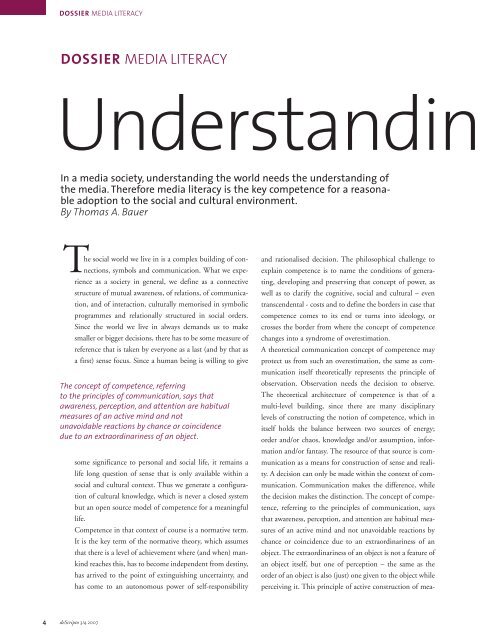DOSSIER
DOSSIER
DOSSIER
You also want an ePaper? Increase the reach of your titles
YUMPU automatically turns print PDFs into web optimized ePapers that Google loves.
4<br />
<strong>DOSSIER</strong> MEDIA LITERACY<br />
<strong>DOSSIER</strong> MEDIA LITERACY<br />
Understandin<br />
In a media society, understanding the world needs the understanding of<br />
the media. Therefore media literacy is the key competence for a reasonable<br />
adoption to the social and cultural environment.<br />
By Thomas A. Bauer<br />
The social world we live in is a complex building of connections,<br />
symbols and communication. What we experience<br />
as a society in general, we define as a connective<br />
structure of mutual awareness, of relations, of communication,<br />
and of interaction, culturally memorised in symbolic<br />
programmes and relationally structured in social orders.<br />
Since the world we live in always demands us to make<br />
smaller or bigger decisions, there has to be some measure of<br />
reference that is taken by everyone as a last (and by that as<br />
a first) sense focus. Since a human being is willing to give<br />
The concept of competence, referring<br />
to the principles of communication, says that<br />
awareness, perception, and attention are habitual<br />
measures of an active mind and not<br />
unavoidable reactions by chance or coincidence<br />
due to an extraordinariness of an object.<br />
some significance to personal and social life, it remains a<br />
life long question of sense that is only available within a<br />
social and cultural context. Thus we generate a configuration<br />
of cultural knowledge, which is never a closed system<br />
but an open source model of competence for a meaningful<br />
life.<br />
Competence in that context of course is a normative term.<br />
It is the key term of the normative theory, which assumes<br />
that there is a level of achievement where (and when) mankind<br />
reaches this, has to become independent from destiny,<br />
has arrived to the point of extinguishing uncertainty, and<br />
has come to an autonomous power of self-responsibility<br />
deScripto 3/4 2007<br />
and rationalised decision. The philosophical challenge to<br />
explain competence is to name the conditions of generating,<br />
developing and preserving that concept of power, as<br />
well as to clarify the cognitive, social and cultural – even<br />
transcendental - costs and to define the borders in case that<br />
competence comes to its end or turns into ideology, or<br />
crosses the border from where the concept of competence<br />
changes into a syndrome of overestimation.<br />
A theoretical communication concept of competence may<br />
protect us from such an overestimation, the same as communication<br />
itself theoretically represents the principle of<br />
observation. Observation needs the decision to observe.<br />
The theoretical architecture of competence is that of a<br />
multi-level building, since there are many disciplinary<br />
levels of constructing the notion of competence, which in<br />
itself holds the balance between two sources of energy;<br />
order and/or chaos, knowledge and/or assumption, information<br />
and/or fantasy. The resource of that source is communication<br />
as a means for construction of sense and reality.<br />
A decision can only be made within the context of communication.<br />
Communication makes the difference, while<br />
the decision makes the distinction. The concept of competence,<br />
referring to the principles of communication, says<br />
that awareness, perception, and attention are habitual measures<br />
of an active mind and not unavoidable reactions by<br />
chance or coincidence due to an extraordinariness of an<br />
object. The extraordinariness of an object is not a feature of<br />
an object itself, but one of perception – the same as the<br />
order of an object is also (just) one given to the object while<br />
perceiving it. This principle of active construction of mea

















